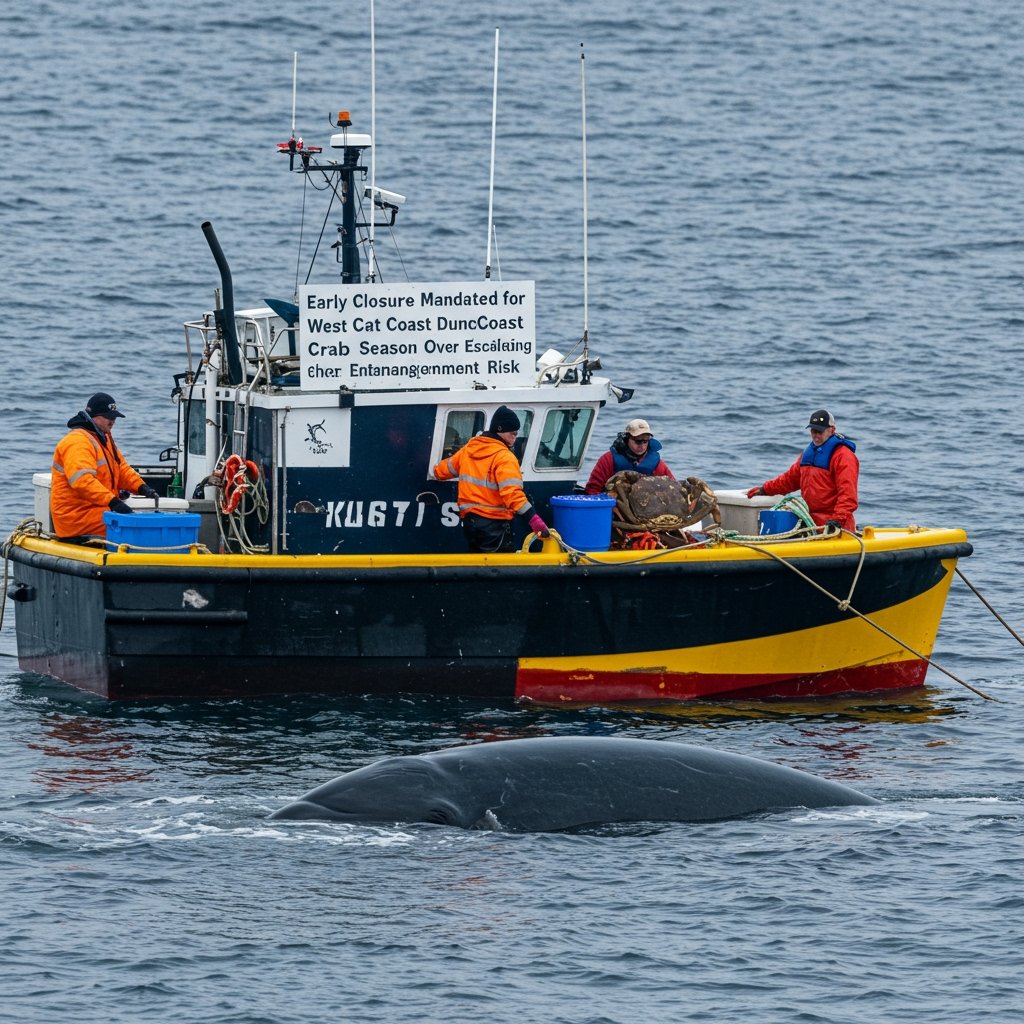Federal Regulators Order Abbreviated Dungeness Crab Season
Washington D.C. — The National Oceanic and Atmospheric Administration (NOAA) issued new emergency regulations on May 28, 2025, mandating a significant shortening of the upcoming Dungeness crab fishing season along the coasts of California, Oregon, and Washington. This federal action, coming late in the traditional management cycle, cites a pronounced increase in the risk of whale entanglement with fishing gear as the primary driver, linking this heightened threat directly to ongoing changes in ocean conditions and rising water temperatures that are reportedly altering marine mammal migration patterns.
According to NOAA officials, warmer ocean waters, a consequence of climate change, are believed to be influencing where and when whales migrate and forage. This can lead to increased overlap between areas of high whale activity and established Dungeness crab fishing grounds, where traps and the lines connecting them to surface buoys pose a significant entanglement hazard. Species particularly vulnerable to entanglement in crabbing gear include humpback whales, blue whales, and gray whales, which are protected under federal law.
Industry Voices Strong Opposition to Emergency Rule
The announcement was met with immediate and fervent opposition from representatives of the fishing industry. The Pacific Coast Federation of Fishermen’s Associations (PCFFA), a prominent industry group, was swift to voice its strong disapproval of the emergency regulations. In a statement released shortly after NOAA’s announcement, the PCFFA estimated that the mandated early closure could inflict potential economic losses exceeding $50 million for the current season alone. This figure represents a substantial blow to a fishery that is not only culturally significant but also provides hundreds of millions of dollars annually to the regional economy across the three affected states.
The PCFFA also issued an urgent plea to the state governments of California, Oregon, and Washington, calling for the rapid implementation of aid programs to help mitigate the financial devastation anticipated by the abrupt curtailment of fishing activities. Industry leaders argue that while they share concerns for marine life, the emergency nature and timing of the federal order create an untenable situation for businesses and families dependent on the Dungeness crab harvest.
Fishermen Grapple with Late Notification and Economic Fallout
Commercial crabbers along the West Coast expressed deep frustration regarding the late timing of the federal announcement. Many had already made substantial investments in preparing for the later part of the season, including maintenance of vessels and gear, purchasing bait, and securing contracts for their anticipated catch. The sudden imposition of restrictions leaves them with little time to adjust their business plans, pivot to alternative fisheries if available, or mitigate their financial exposure.
Furthermore, the shortening of the season is expected to significantly impact supply chains that rely heavily on the timely and consistent availability of this lucrative fishery product. Wholesale markets, seafood processors, restaurants, and retailers, both domestically and internationally, depend on the Dungeness crab supply. Disruptions at this stage ripple through the entire distribution network, potentially leading to product shortages, price volatility, and negative impacts on associated businesses and labor.
Crabbers highlighted the difficulty of responding effectively to regulations announced so late in the season, particularly emergency rules that take effect quickly. They stressed that proactive, collaborative planning between regulators and the industry is essential for managing complex environmental challenges while minimizing socioeconomic harm. The industry has previously engaged in efforts to reduce entanglement risk through gear modifications and best practices, but the scale of the reported risk increase has apparently prompted more drastic federal intervention.
Collaborative Efforts and Future Outlook
In the wake of the controversial federal order, discussions are reportedly underway between NOAA, industry representatives, and state fish and wildlife agencies across California, Oregon, and Washington. These dialogues aim to explore potential mitigation strategies that could allow for fishing to resume safely in the future or reduce entanglement risks in subsequent seasons. Such strategies might include dynamic area closures based on real-time whale presence data, alternative fishing gear configurations, or modifications to deployment methods.
Simultaneously, the focus of these discussions includes the urgent need for financial support programs for affected fishermen and processors. State agencies, often responsible for managing the state-specific components of the fishery and providing social services, are being urged to step in with emergency aid packages. The goal is to provide a safety net for those facing significant income losses and potential economic hardship as a direct result of the federal emergency regulations.
The situation underscores the growing complexities at the intersection of marine conservation, climate change impacts, and commercial fishing operations. While the federal government emphasizes the necessity of protecting endangered marine life, the industry highlights the severe economic repercussions and the need for timely, predictable, and collaborative management approaches. The outcome of ongoing discussions and the effectiveness of potential aid programs will be crucial in determining the long-term viability of the Dungeness crab fishery and the communities it supports on the West Coast.



















